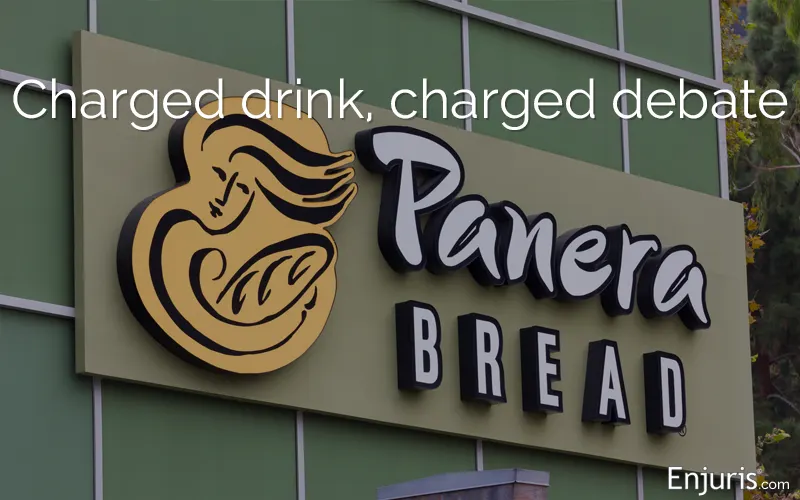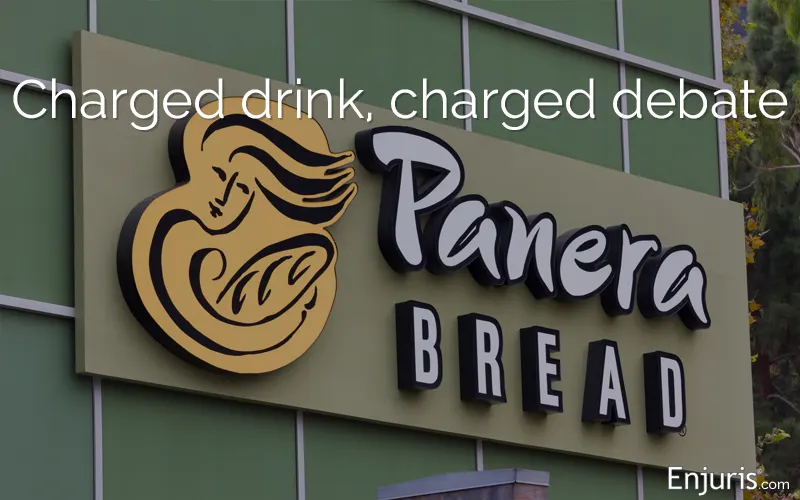[ad_1]

On October 9, 2023, Dennis Brown, a 46-year-old Florida man, suffered a fatal cardiac event while walking home from Panera Bread in Florida.
The alleged cause of his death? Panera Bread’s Charged Lemonade.
Let’s take a closer look at the facts of this case, the wrongful death lawsuit, and product liability lawsuits more generally.
Charged Lemonade: A controversial beverage
Panera Bread’s Charged Lemonade has been at the center of controversy due to its exceptionally high caffeine content.
A large size of the drink contains more caffeine than a 12-ounce Red Bull and a 16-ounce Monster Energy drink combined.
Just how much caffeine is that?
A regular Charged Lemonade has 260 milligrams of caffeine, and a large one has 390 milligrams.
Healthy adults can consume 400 milligrams of caffeine per day, according to the Food and Drug Administration. However, the FDA cautions that there is wide variability in terms of how sensitive people are to the effects of caffeine.
The impact of coffee on heart health is inconsistent and widely debated. At least some studies have shown that moderate coffee consumption resulted in decreased risk of heart problems, and heavy coffee consumption resulted in increased risk.
The Panera Bread lawsuit
Dennis Brown ordered a Charged Lemonade at Panera Bread in Fleming, Florida. He had two refills (that’s at least 780 milligrams of caffeine). During the walk home, he suffered a cardiac event and was found unresponsive on a sidewalk. A short time later, he was pronounced dead. The cause of death listed on his death certificate was “cardiac arrest due to hypertensive disease.”
Mr. Brown’s family filed a wrongful death lawsuit in Superior Court in Delaware. The lawsuit alleged that Panera Bread “knew or should have known” that the drink could injure people sensitive to caffeine. What’s more, the lawsuit alleged that the drink was offered side-by-side with drinks containing no caffeine, and the Charged Lemonade drink was not advertised as an energy drink and did not have any warnings.
Dennis Brown is not the first person to allegedly die as a result of drinking a Charged Lemonade. Sarah Katz, an Ivy League student with a heart condition, suffered a fatal heart attack after drinking Panera’s Charged Lemonade in 2022.
Following the death of Sarah Katzy, Panera Bread announced that it had “enhanced [its] existing caffeine disclosure” on its website and its restaurants.
Both lawsuits are currently pending.
Understanding product liability lawsuits
These lawsuits against Panera Bread fall under the broader category of product liability lawsuits. Product liability lawsuits hold manufacturers, distributors, and retailers responsible for injuries caused by defective or dangerous products.
There are three main types of product liability claims: design defects, manufacturing defects, and failure to warn (marketing defects):
| Type | Definition | Example |
|---|---|---|
| Manufacturing defect | A defectively manufactured product is one that—though properly designed—left the manufacturer in a condition other than intended. | For instance, a piece of metal from a malfunctioning machine might inadvertently get sealed into some cans of soup, posing a significant health risk to consumers. |
| Design defect | A product is defectively designed if it fails to perform as safely as a reasonable person would expect, even when used as intended (or at least in a manner that was reasonably foreseeable) | For instance, a type of hard candy shaped in a size and form that poses a high risk of choking, especially for children. |
| Failure to warn | Manufacturers have a duty to warn users of the dangers that can be reasonably anticipated and that are inherent in their products. | For instance, a snack containing high levels of a common allergen, like peanuts, without clear labeling on the package. |
In the context of the Panera lawsuits, the claims are akin to failure-to-warn lawsuits, where the plaintiffs allege that Panera did not adequately warn consumers about the high caffeine content and its potential risks, especially to individuals with pre-existing health conditions.
Product liability claims are based on negligence or strict liability:
| Negligence vs. strict liability | |
|---|---|
In a product liability case based on negligence, the plaintiff must prove that:
|
In a product liability case based on strict liability, the plaintiff must prove that:
|
Product liability attorneys conduct discovery in order to obtain as much evidence as possible to support the product liability claim. This evidence might include:
- The defective product (or a similar product if the actual product is no longer available)
- The product manufacturing guidelines
- Video footage from the manufacturing plant
- Relevant internal communications (such as emails between designers discussing potential problems with the design)
- Incident reports
- Medical records
- Testimony from designers, manufacturers, and others who can speak about the defective product
The lawsuit against Panera Bread raises critical questions about corporate responsibility and consumer safety. The outcome of the lawsuit could set a precedent for how similar cases are handled in the future. If you were harmed by a defective food item, consider reaching out to an experienced personal injury attorney.
[ad_2]



